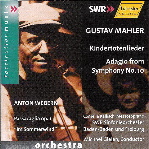Michael Gielen’s Mahler on the Hänssler label is shaping up to be one of the more trenchant cycles available in today’s overcrowded market. As with other releases that contextualize Mahler in the spirit of his forebears (Schubert, for one) and his progeny (Berg, Webern, Schreker, and Schoenberg), this disc points up the influence of Mahler on early Webern, and in a sort of post-modern hermeneutical way, how we might receive Mahler’s music in light of what followed him. As a unified musical experience, this combination is indeed a success, no matter how draining this angst-ridden music might be if absorbed in one sitting.
It’s easy to see why Gielen keeps turning to Cornelia Kallisch for his Mahler representations (she appears in recordings of the Second and Third symphonies): her wonderful contralto voice is velvety, deep, rich, easily modulated, and ideally suited to the mood of the music. She yields nothing to the great interpreters of these harrowing songs (Janet Baker and Christa Ludwig, to name two), and Gielen and his SWR forces provide her with a well-balanced orchestral backdrop that never descends into treacly exaggeration. In fact, Gielen’s fidelity to the score, while at times resulting in an icy exterior, captures all the emotion we would ever want from this music without over-interpreting it.
Gielen pursues textual accuracy as well in the Adagio from Mahler’s 10th Symphony, observing (unlike some other conductors) the flexible tempos that the composer indicates throughout this transcendent movement. This is one of the faster performances on disc today, clocking in at slightly more than 22 minutes; as such, it’s a performance that conveys momentum, inner logic, and sense of direction. Consistent with his other Mahler performances, Gielen is unafraid to let the orchestra emit some strident and ugly sounds (the raucous trilling clarinets, sudden sforzandos in the trombones, the piercing shrieks from the violins and flutes) and so there is a certain sacrifice of overall tonal beauty, a kind of raw, grainy sound from the orchestra that makes this music feel less autumnal than others have perceived it. The massive climax lacks the earth-shattering impact of, say, Yoel Levi’s recent recording for Telarc, but there is no mistaking the terror conveyed by those awful chords.
The twin Webern works receive excellent readings, but whatever the intellectual relevance to their inclusion on this disc, they seem more like after-thoughts. And they have been bettered by Dohnanyi and the Cleveland Orchestra (Decca) in terms of clarity, recorded sound, and general orchestral virtuosity. Either way, they are terrific bonuses offered by a conductor of considerable insight and experience in this music.
































